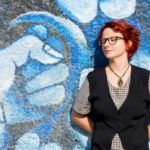| TITLE OF PAPER |
Is it possible to develop women-friendly spaces, within such a non-space as refugee camp, into an empowerment tool for women? An approach to a case study of refugee camp in Katsikas, Greece. |
| AUTHORS NAME |
Emilia Debska |
| AFFILIATION |
Mundo en Movimiento (NGO) |
| UNIVERSITY / INSTITUTE |
KOIZ – Center for Postcolonial Studies |
| MAIL |
emilia_debska@hotmail.com |
| ABSTRACT |
Refugee camps are non-spaces that are hostile for all its’ residents but proven to be particularly hard on women, one of the most vulnerable collectives there.
Many NGOs create women-friendly spaces which should become safe places where women can share their experiences, troubles and intimacies. There also exist informal women-friendly spaces that pop-up spontaneously in their families’ tents or even during visits to a hammam.
Those spaces seem to be in a confrontation with the reality of a refugee camp – a non-space where people live in constant transition and uncertain of their destiny. They create borders that protect women, and invocate their individual identities. In those spaces, others have a chance to become us and women have the opportunity to express freely their thoughts and even sexuality.
The general objective of this work is to listen to the first generation of women who lived at Katsikas and participated in women-friendly spaces. It will be done through a participative methodology that places women at the centre of the process where they are not objects of knowledge but active subjects in its’ construction, in order to know if those women-friendly spaces could serve as an empowerment tool and if they are something that could help women and their families into a passage from a refugee camp non-space to our occidental reality.
The specific objective is to design a project, conducted in the camp of Katsikas, that would implement the feedback and information we will obtain from this study and analyse the women-friendly spaces that already exist, taking into account social relationships and processes that arise in them.
In this study the information will be obtained through interviews and feedback of the following sources: first generation of women from Katsikas, NGO workers who participated in the construction of both the refugee camp and women-friendly spaces, and, finally, we also intent to get some real snapshots proceeding from women who are living there now.
We believe there is a strength in places where women can share their thoughts and become a tribe. This is why we want to hear them out.
|
| BIOGRAPHY |
Degree in Marketing and Communication (ITT Dublin) and Master Degree in International Cooperation and Development (Universidad Pontificia Comillas, Madrid). Her main areas of study and research are women’s studies with particular focus on women rights and transmission of knowledge between cultures.
|
| CO-AUTHORS |
Koro J-A Juanena, PhD in Anthropology, Rey Juan Carlos I University (Madrid), Diploma of Advanced Studies (DEA) in International and African Studies (Autonomous University of Madrid), Bachelor in Sociology (National University of Distance Education).
|
| KEYWORDS |
migrations, refugees, women, non-spaces, sexuality, experiences |
| STREAM |
2. Migration: Sexual and Gendered Displacements |
| COMMENTS |
|
| PICTURE |
 |
| Webpage |
|
| Twitter |
|
| Facebook |
|


























